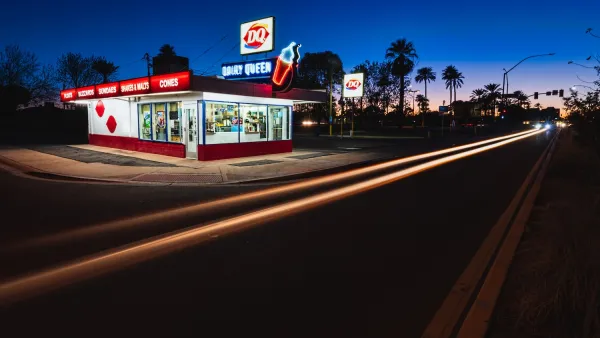The "food court", staple of malldom and home of Hot Dog on a Stick, is dead, say retail architects and designers. Higher-end restaurants and softer surfaces are replacing the shiny plastic tables and Orange Juliuses of the past.
While fast food isn't going away, environments are going upscale and nicer restaurants are adding to the mix, says Retail Traffic Magazine. And as we reported back in 2008, restaurants have often become a more stable draw then retail stores.
From Retail Traffic Magazine: "Until recent years, most food courts looked like they might have taken style pointers from their counterparts at schools, prisons or military barracks. As one architect puts it, they were designed for the 'janitocracy'-easy to clean and maintain, but arranged without regard for the customer's experience. And that was just fine, as owners wanted customers only to eat and then be on their way.
As a result, food courts now have 'a stigma of cheap furniture and tile and the same old tenants,' [Marios Savopoulos, a principal at Perkowitz + Ruth Architects] says. 'And that's not what people want.'"
FULL STORY: Mall Owners Are Giving Food Courts and Common Areas a Facelif

Maui's Vacation Rental Debate Turns Ugly
Verbal attacks, misinformation campaigns and fistfights plague a high-stakes debate to convert thousands of vacation rentals into long-term housing.

Planetizen Federal Action Tracker
A weekly monitor of how Trump’s orders and actions are impacting planners and planning in America.

In Urban Planning, AI Prompting Could be the New Design Thinking
Creativity has long been key to great urban design. What if we see AI as our new creative partner?

King County Supportive Housing Program Offers Hope for Unhoused Residents
The county is taking a ‘Housing First’ approach that prioritizes getting people into housing, then offering wraparound supportive services.

Researchers Use AI to Get Clearer Picture of US Housing
Analysts are using artificial intelligence to supercharge their research by allowing them to comb through data faster. Though these AI tools can be error prone, they save time and housing researchers are optimistic about the future.

Making Shared Micromobility More Inclusive
Cities and shared mobility system operators can do more to include people with disabilities in planning and operations, per a new report.
Urban Design for Planners 1: Software Tools
This six-course series explores essential urban design concepts using open source software and equips planners with the tools they need to participate fully in the urban design process.
Planning for Universal Design
Learn the tools for implementing Universal Design in planning regulations.
planning NEXT
Appalachian Highlands Housing Partners
Mpact (founded as Rail~Volution)
City of Camden Redevelopment Agency
City of Astoria
City of Portland
City of Laramie





























